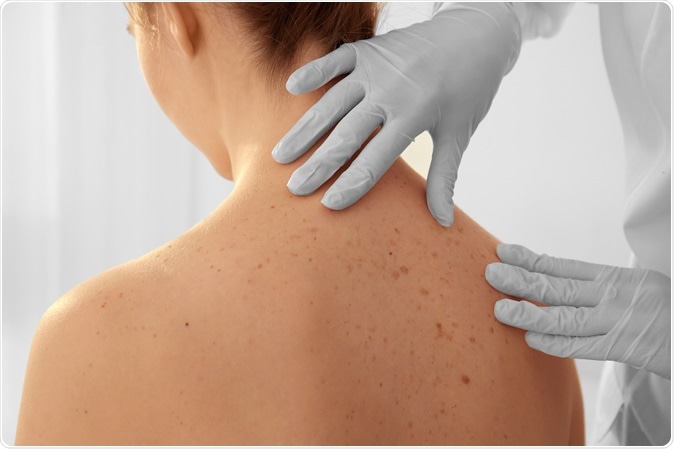West Australian researchers from Edith Cowan University have managed to develop a blood test that is capable of diagnosing melanomas before they can spread to other parts of the body. The study titled, “A diagnostic autoantibody signature for primary cutaneous melanoma,” was published in the latest issue of the journal Oncotarget.

Dermatologist examining patient in clinic, closeup. Image Credit: Africa Studio / Shutterstock
The team of researchers have devised the blood tests that can detect autoantibodies that the body usually makes when it encounters skin cancer cells. They conducted a trial involving 105 people with melanoma and successfully detected the cancer in early stages in 81.5 percent of the cases using the blood test. Nearly 14,000 such skin cancer cases are detected each year in Australia with at least 2000 dying from it annually making it the fourth common type of cancer in Australia. Melanoma forms around 1 to 2 percent of all skin cancers but is considered to be the deadliest.
The study was led by Pauline Zaenker, part of the Melanoma Research Group at the Edith Cowan. According to her common practice now to detect skin cancer is by analysing skin biopsies. However three fourths of all biopsy samples come back negative even in presence of the cancer, she explained. With advent of this test, the doctors would not need to depend on these costly biopsies alone which are invasive as not always reliable she said. Biopsies for detection of skin cancers costs Australia $201 million a year she added. Of this $73 million is spent on tests that come back false negative.
According to Zaenker, as soon as the melanoma develops, the body begins to produce these antibodies and this helps in the detection of the cancer in early stages using this blood test. She added that there are no other biomarkers that can detect the cancer this early in the cancer. She said that the team examined 1627 different types of antibodies before they found that there was a combination of 10 antibodies that could predict that a person had the melanoma when compared to healthy persons. Survival after detection of skin cancer in early stages is 90 to 99 percent which drops to half if it is detected once the cancer has spread to other organs she explained.
According to the head of the Melanoma research group, Professor Mel Ziman, this study is to be followed up with a clinical trial, which if successful could mean that this test would be clinically used in around the next three years. She said that this would provide a “diagnostic certainty” before biopsy results when screening people for melanoma. This could especially be useful in those with a higher risk of melanoma. High risk individuals, she explained, are those who have pale skin, large number of moles and a family history of skin cancer.
According to the Cancer Council, the best protection against melanomas is protection against the sun’s harmful ultraviolet rays. Melanomas usually show up as skin lesions that have an irregular surface and edges and may vary in colour from black, brown, blue, red, white, grey etc. If not treated, this cancer is capable of spreading deeper into the skin from where it is carried to other organs via lymphatic channels and blood vessels. Cancer Council Australia chief executive Professor Sanchia Aranda called this new study an “interesting development” and hopes that it would be proven in larger clinical trials in the near future.